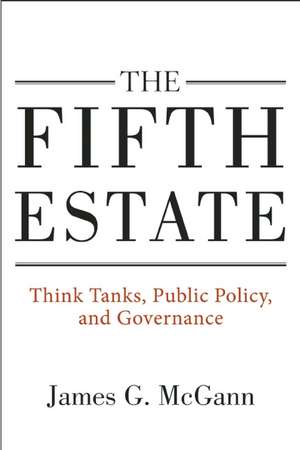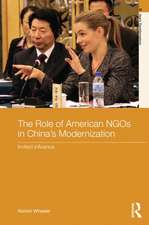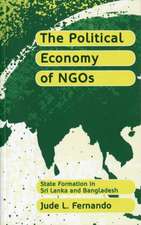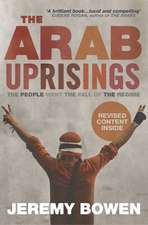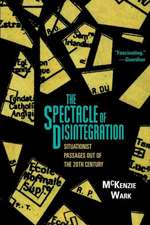The Fifth Estate: Think Tanks, Public Policy, and Governance
Autor James G. McGannen Limba Engleză Hardback – 13 sep 2016
What role do think tanks play in shaping public policy and public discourse in the United States?
In The Fifth Estate: Think Tanks, Public Policy, and Governance, James G. McGann illustrates how policymakers have come to value the independent analysis and advice provided by think tanks and why it has become one of the defining characteristics of the American political system. Drawing on case studies in both foreign and domestic policy, McGann clarifies the correlation between think tank research and the policies enacted by the past three presidential administrations. He also describes a phenomenon known as “the revolving door,” where think tanks provide former government officials an opportunity to share insights from public service, remain involved in policy debates, and continue to provide advice and commentary.
Based on the history and the level of involvement seen today, the influence of think tanks is unlikely to diminish in the coming years.
In The Fifth Estate: Think Tanks, Public Policy, and Governance, James G. McGann illustrates how policymakers have come to value the independent analysis and advice provided by think tanks and why it has become one of the defining characteristics of the American political system. Drawing on case studies in both foreign and domestic policy, McGann clarifies the correlation between think tank research and the policies enacted by the past three presidential administrations. He also describes a phenomenon known as “the revolving door,” where think tanks provide former government officials an opportunity to share insights from public service, remain involved in policy debates, and continue to provide advice and commentary.
Based on the history and the level of involvement seen today, the influence of think tanks is unlikely to diminish in the coming years.
Preț: 247.40 lei
Nou
Puncte Express: 371
Preț estimativ în valută:
47.35€ • 49.25$ • 39.68£
47.35€ • 49.25$ • 39.68£
Carte disponibilă
Livrare economică 20 februarie-06 martie
Preluare comenzi: 021 569.72.76
Specificații
ISBN-13: 9780815728306
ISBN-10: 0815728301
Pagini: 240
Dimensiuni: 152 x 229 x 25 mm
Greutate: 0.54 kg
Editura: Brookings Institution Press
Colecția Brookings Institution Press
ISBN-10: 0815728301
Pagini: 240
Dimensiuni: 152 x 229 x 25 mm
Greutate: 0.54 kg
Editura: Brookings Institution Press
Colecția Brookings Institution Press
Notă biografică
James G. McGann is senior lecturer in International Studies and director of the Think Tank and Civil Societies Program at the University of Pennsylvania. He is also author of several books, including, most recently, Democratization and Market Reform in Developing and Transitional Countries: Think Tanks as Catalysts, and the coeditor of How Think Tanks Shape Social Development Policies.
Textul de pe ultima copertă
From the introduction
The U.S. government and its allies face an ever-changing political landscape, wielding policy to combat the problems that plague society and its interests. In the midst of this high-stakes environment, think tanks have carved out a niche in U.S. civil society.
The think tank landscape is much more complex today and includes traditional academic-oriented research centers and policy activists. Some scholars . . . perceive the rising role of think tanks as a negative development for politics. . . . that think tanks have become instruments of . . . ruling class power. There is also a growing community of scholars . . . who regard think tanks as closely tied entities that have been given the task of espousing a
neoliberal economic and political perspective.
The U.S. government and its allies face an ever-changing political landscape, wielding policy to combat the problems that plague society and its interests. In the midst of this high-stakes environment, think tanks have carved out a niche in U.S. civil society.
The think tank landscape is much more complex today and includes traditional academic-oriented research centers and policy activists. Some scholars . . . perceive the rising role of think tanks as a negative development for politics. . . . that think tanks have become instruments of . . . ruling class power. There is also a growing community of scholars . . . who regard think tanks as closely tied entities that have been given the task of espousing a
neoliberal economic and political perspective.
